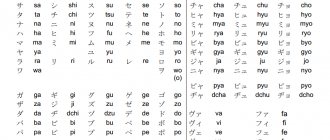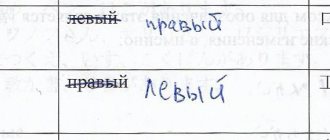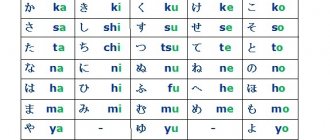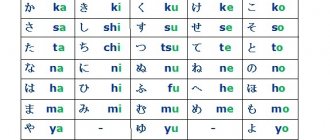“Is it difficult to learn Japanese from scratch?” , - this is the question asked by everyone who wants to learn Japanese. Possible difficulties and pitfalls are discussed in this article. On the one hand, we see such an elegant and mysterious culture of the Land of the Rising Sun, and on the other, an abundance of hieroglyphs with “on” and “kun” readings, difficult-to-understand grammar that literally blows the mind of anyone who crosses the line after which the world will never again will not be the same. Is this feeling familiar? So let's get a full picture of the obvious (and not so obvious) difficulties that turn the pleasant process of learning Japanese into real hard labor.
In terms of how much effort you need to make when learning a language
In this sense, learning Japanese is easy: it doesn’t require much effort, nor does it require any special skills or talent. Also, you don’t need to worry that you don’t have a knack for languages - in fact, this is a myth that appeared due to fundamentally incorrect learning methods. If you have problems learning Japanese, try following this guide on How to Learn Japanese. It can also be difficult to study in the absence of motivation, for example, school English language programs in many countries suffer from this (coupled with the most terrible learning methods). Moreover, the motivation should not be such that “in 20 years I may need it,” but so that I can get the benefit instantly. One way to do this is to watch something in the language you are learning, for example, films or TV series (with Russian subtitles or subtitles in the original language). This is useful because:
- You will naturally have a desire to understand what they are saying = motivation.
- You can start using every thing you learn instantly, and not after 20 years = motivation.
- In order for the learned things to be remembered, they must be heard several times in real speech, otherwise they will be forgotten, which means that you cannot do without listening (when you listen to or watch something in this language).
- In fact, no language can
be learned without listening. Listening is required! For an average level you need about 1000 hours of listening, for a high level - 2000, for a very high level - 3000, for a native level - 5000. However, even 100 hours of listening provides enormous benefits. No matter how much you listen to, it is always useful, and it always increases your level.
Without the first step there will be no rest.
I met people who had the necessary materials (floor 2) and teachers (floor 2) and they had all sorts of techniques in their arsenal (floor 3), but in the end, without a foundation (floor 1) their whole pyramid collapses like a house of cards. Simply because there is no normal foundation. By taking away something from above you can still somehow learn, but without the bottom element of the pyramid there will be no top ones. Sooner or later!
It is important to understand that you will not be able to build a “reverse” pyramid, no matter how hard you try. For some reason everyone forgets that the 2nd stage is not the most important and not the 3rd stage. And especially not the very top of the pyramid. The foundation is important, our first step.
If we have figured out the foundation and main floors and imagine that everything is fine here, then next I want to tell you what “bricks” we need to use to complete the pyramid so that it is larger and stronger, because each step will add +2% to your knowledge . Let each next step be much smaller in size, but still, the building will be higher than the others. Each brick will allow you to build a pyramid a little higher and stronger, and this will make up a whole system.
Yes, this is not much, and more effective methods were in previous videos that really work here and now. And when properly mastered, they provide a strong increase in knowledge.
True, there are several more effective techniques that I saved for later, which will also go into the 3rd stage, but more on that later. However, if you have mastered the previous videos and do not know how to make your training even more effective, then watch further. This will not give a colossal effect, but using every additional brick, even the smallest one, in total you will get a greater increase than those who do not. We will talk about this in the second part.
Returning to the main question of the video, why do some of you fail to learn Japanese? Yes, because now you have a foundation from a barn, and not from a pyramid.
In terms of time required to study
In this sense, Japanese is quite complex: at the maximum level (like a native) you will need 2800 hours, at a very high level - 1700 hours, at a high level - 1300 hours and at an average level - 900 hours. You also need to listen or watch in this language (for example, a TV series with Russian or Japanese subtitles): at the maximum level (like a native) you need to watch about 5000 hours, at a very high level - 3000 hours, at a high level - 2000 hours and at an average level - 1000 hours. However, this is not a problem, because listening is fun. You watch the series not to learn the language, but to enjoy watching it. However, it is impossible to learn a language without listening; it is mandatory. For more information, see our article How long does it take to learn Japanese.
A language that can help you learn other languages
Japanese is one of the most difficult languages to learn, but it can open the door to other Asian languages. For Russian speakers, Japanese will seem completely different for obvious reasons. The writing system is complex as there are three different types of signs, as well as polite and other different forms of speech depending on the context.
It was difficult for me to realize this at first, but after learning Japanese, I noticed that I could understand some words written in Chinese by learning the characters. Knowing Japanese also helps me a lot in learning Korean due to its grammatical similarities.
Learning a new language (especially Japanese or other Asian languages) can open up a whole new world of literature, movies, music, games, anime, manga, and other media. The most popular materials are usually translated into English and other languages, but less popular Japanese films or anime remain either untranslated or with poor quality translations. Understanding and speaking Japanese is a way to better understand the culture and discover a side of Japan that you would never be able to understand without knowing the language.
Compared to other languages (in terms of learning time)
The easiest way to compare it is with English:
- Japanese uses 30 thousand words (2000 hours to study), and English only 20 thousand (1333 hours to study).
- In Japanese you need to know 3 thousand characters (600 hours to study), and in English 26 letters (5 hours to study).
As a result, to learn Japanese to a level close to native, you need about 2800 hours, and in English about 1500 hours are enough (without taking into account the time for listening, which was mentioned above). Of course, most people don’t need such a high level, but even at lower levels in Japanese you need to know 1.5 times more words than in English, and you also need to know 1.5–2.5 thousand characters (300–500 hours to study). As a result, Japanese is much more difficult than English, as it requires approximately 1.9 times more time to learn.
The writing system may be the most complex in the world
Japan did not have a writing system until it adopted and adapted Chinese characters. Like the English language and its alphabet, the language and writing system are not the same. In addition, the Chinese reading of each kanji was also carried over along with the native Japanese word. For example, in tonkotsu (豚骨), the first kanji for tone is pork, but we don't say tone when we mean pig, we say buta. "Tone" is the Chinese reading and "buta" is the Japanese reading.
Additionally, since much of Japanese grammar depends on suffixes (additions to the endings of words), Japanese linguistic scholars had to create a new system to display these suffixes. This is how hiragana was born, and later katakana. Therefore, if you want to learn Japanese, you need to learn three independent writing systems. The best thing, of course, is to find out how much it costs to study at a language school in Japan and learn Japanese there.
In terms of similarity to already familiar languages
The closer a language is to those already familiar, the easier it is to learn. Here you can divide the intersection into two parts:
- Vocabulary crossing. This is important because learning words takes up the most time when learning a language, and if the vocabulary is at least partially the same, it will save time. Words are generally the most difficult thing in any language, because there are a lot of them. For comparison, the language being studied may contain 50 grammatical rules, but tens of thousands of words, which is why all grammar can be learned, for example, in 20–100 hours, and words in 1–3 thousand hours. Japanese in this regard is difficult for Russian speakers: there is practically no overlap of vocabulary with Russian, and the overlap with English is only 3 thousand words out of 30 thousand used. Japanese borrowed these 3 thousand words from English. The remaining words are either borrowed from Chinese or are purely Japanese.
- Similarity of grammar. This is less important, but the similarity of the grammar provides three advantages:
- If the grammar is similar, you will need much less time to train your speaking skills (if you need them). The fact is that in order to have any skill, you need to train it with practice, and speaking skill is no exception. But if the grammars are similar, we can say that you have already practiced in your native language. For comparison, English grammar has a lot in common with Russian, and thanks to this, Russian speakers need to train speaking skills in English at least 10 times less than, for example, when studying Japanese or Korean.
- Less time is needed to study grammar. This is less important because there are usually not many grammatical rules compared to the number of words.
- Less time is needed to consolidate grammar. Once you have learned the grammar, you need to spend some time watching/listening to that language to begin to understand it on a subconscious level. But if you already know this grammar in another language, then it will take less time.
Japanese grammar is completely different from Russian or English, which means speaking skills (if needed) will have to be trained from scratch. There is also no way to save time on learning or understanding grammar.
Is it worth learning Japanese?
Before we figure out whether it’s difficult to learn Japanese, let’s think about whether the game is even worth the candle and whether you need knowledge of Japanese. Already at the initial level you should answer yourself several important questions :
Why do I want to learn Japanese?
More precisely, you must understand how you want to use the Japanese language and why you need it at all. Why is this question so important? Because the answer to it will be the foundation of your motivation. Whether you plan to learn Japanese from scratch on your own using a textbook, online, or with the help of a teacher, it doesn’t matter. First, be clear about your motivation . Especially in difficult times, when instead of another grammar task or writing kanji, you want to watch anime in your native language, motivation will be the only factor that will make you put in the effort to learn the language.
Without understanding what you are trying to achieve, the rules of the Japanese language will undoubtedly seem very difficult and perhaps insurmountable. So find what inspires you . Maybe you want to move to Japan or want to have Japanese friends. The main thing is that the more specific your goal and motivation, the easier it will be for you to learn Japanese.
How will I learn Japanese?
Learning Japanese from scratch on your own is a task that requires a clear plan . You must understand what you will do and how . Many people do not pay enough attention to this, but it is better to find a textbook that will best suit your study plan. These questions and how to learn Japanese on your own are discussed in more detail here.
Of course, a Japanese language teacher is the most tried and true option. You don’t have to create a program yourself and constantly remind yourself that it’s time to repeat the words. And also, in case of an error, the teacher will definitely correct you. This way you will quickly learn the basics and maybe even conversational Japanese for beginners. However, if you are not ready to take lessons in person with a teacher, you can always find Japanese language courses (for example, you can search for Japanese on Lingust and start learning Japanese from scratch online for free).
How much time can I really devote to the language?
You must understand how much time you are willing to devote to the language . And this applies not only to Japanese. When you start learning any foreign languages (be it English, Italian, Chinese or German), you need to decide, for example, how many hours you are willing to study per week. If you are ready to study 3 hours a week - great, only 1 hour - also great. What is important here is regularity , which you yourself will monitor. However, please note that the materials you will study from will depend on the time you are willing to devote to the language. If you are interested in how to quickly learn Japanese, then you should pay attention to the applications . This is a great option if you are short on time and have few funds at your disposal. For example, NHK makes Japanese language lessons interesting and teaches spoken Japanese. This way you can learn Japanese from scratch for free. Read more about free apps for learning Japanese by following the link.









